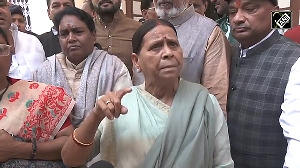 The US welcomes more prominent and effective role played by India on a wide range of global problems from climate change to maritime security, a top White House official has said
The US welcomes more prominent and effective role played by India on a wide range of global problems from climate change to maritime security, a top White House official has said
"We welcome India not just because it is consequential because we share and often promote norms about a rules based order," Peter Lavoy, the White House’s point person for South Asia, told a Washington audience.
"The US welcomes more prominent and effective role that India is playing on a wide range of world problems from climate change and global health to peace keeping, maritime security and cyber governance."
He said that the US-India partnership has come a long way in the past eight years, but the best is yet to come.
"We are handing over to the next team, a major defence partnership with India," he said as he highlighted the vibrant dimensions of the Indo-US relationship.
"First a growing convergence on regional issues. Second deepening cooperation on defense trade and third broadening in security partnership," said Lavoy, Senior Director for South Asia at the National Security Council, said in his remarks at the Center for Strategic and International Studies.
During the past six years of Obama Administration, he said there has been growing convergence of views of the risks, threats and opportunities.
"In part this convergence has come apart as we made monumental efforts to overcome specific areas of mistrust," he said, adding that over the years the two countries have built habits of co-operation in discussing the challenge they face.
Three regions where this co-operation has gained momentum are Afghanistan, Asia Pacific and Africa, he said.
Maritime security is the key area of co-operation between the two countries.
Over the last few years, the US has significantly increased its consultations with India on their shared interest in Afghanistan, he said.
India, he said has played an important role in the collective effort of bringing stability and prosperity to that war-torn country, committing more than USD 2 billion in assistance.
The Commander of US forces in Afghanistan now regularly travels to New Delhi to exchange views with Indian leaders, he said.
Lavoy said it is fair to say that the US India defense relationship has matured in the last eight years than any period in US history.
In April, Defence Secretary returned to India for an unprecedented third visit in less than a year.
"There is no country in the world that we are supporting in this manner as an emerging global defense leader. This is unique," the White House official said on the growing India US defence relationship.
"Never in our history we have supported an indigenous aircraft program in any other country," he said.
Lavoy said India US cooperation on counter terrorism has become a crucial pillar of a broader strategic partnership.
This is fitting as the US and India view acts of terrorism as threat to global peace and security but also to their common values of democracy, justice, the rule of law and the protection of every individual.
"The United States has come a long way in security partnership with India. One of the sustaining strength of this relationship is not underpinned by this treaty, but by our common interest and values. It is voluntary and it continues to grow. This strategic logic is simple, it is bipartisan in both nations," he said.
Lavoy said he would like the two countries to adopt more practical collaboration in all domain, in space, in the air, on the sea, under the sea, on land and on multilateral forums, in ways that respects India’s sovereignty but also reflects their status as increasingly close partners who tackle problems side by side.
Today India does count in world affairs, but it has taken a long time for India's aspiration to realise, he said as he recollected a 1949 speech of the first Indian Prime Minister Jawaharlal Nehru.
"It is the most dynamic relationship that we have today. Each of the things that we are doing enables us to take this to the next level and have to simultaneously work on expanding the partnership in new domain," Lavoy said in response to a question.
"This is a unique relationship worldwide where we can't choose between deepening and broadening. We have to do both simultaneously," he added.










 © 2025
© 2025